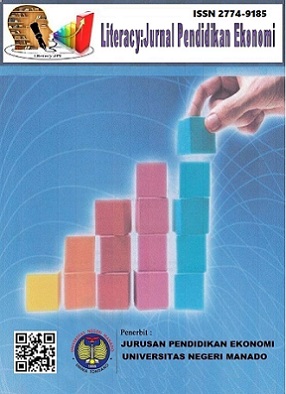THE INFLUENCE OF GENDER AND FAMILY BACKGROUND ON FINANCIAL BEHAVIOR WITH FINANCIAL LITERACY AS A MEDIATION VARIABLE: STUDY ON GENERATION Z TEENS IN JAYAPURA CITY
DOI:
https://doi.org/10.53682/jpeunima.v5i2.10929Keywords:
THE INFLUENCE OF GENDER , FAMILY BACKGROUND , FINANCIAL BEHAVIOR , FINANCIAL LITERACY , MEDIATION VARIABLEAbstract
This study examines the determinants of financial behavior among Generation Z in Jayapura Papua with a specific focus on gender and family background influences mediated by financial literacy Using path analysis the research surveyed 223 respondents aged 17 25 years through accidental sampling The findings reveal that financial literacy directly influences Generation Z s financial behavior with a significance value of 0 003 p lt; 0 05 Both gender and family background significantly affect financial literacy contributing 13 1 to its variance The study demonstrates that gender indirectly influences financial behavior through financial literacy with indirect effects 0 01312 exceeding direct effects 0 153 However family background shows stronger direct effects 0 425 compared to indirect effects 0 0276 on financial behavior indicating that financial literacy does not effectively mediate this relationship The overall model explains 24 7 of the variance in financial behavior These findings contribute to understanding the complex relationships between demographic factors financial literacy and financial behavior among Generation Z in eastern Indonesia s context The study recommends future research to incorporate additional variables to enhance the model s explanatory power and employ more precise measurement techniques < p>
Downloads
References
Ana Ary 2024 July 27 Cendrawasih Pos Retrieved from Business Economy: https: cenderawasihpos jawapos com ekonomi bisnis 27 07 2023 ojk terus Tingkatkan inklusi dan literasi keuangan di papua
Assyfa LN 2020 The Influence of Income Gender and Academic Ability on Personal Financial Management Behavior of Accounting Students with Financial Literacy as an Intervening Variable Accounting Student Research Platform PRISMA 01 01 109 119
Atkinson A Messy F 2012 Measuring Financial Literacy: Results of the OECD International Network on Financial Education INFE Pilot Study OECD Working Papers on Private Finance Insurance and Pensions No 15
Banafanu Y 2024 January 23 DPR RI Kemenparekraf collaborate to increase the capacity of MSMEs in Sorong City Retrieved from ANTARA News: https: www antaranews com berita 3928587 dpr ri kemenparekraf kolaborasi Tingkatkan kapasitas umkm kota sorong : :text=Based on 20data 20Dinas 20Koperasi 20Kota 20UMKM 20seluruhnya 20sebanyak 206 823 20UMKM
Banafanu Y 2024 July 11 OJK calls TPAKD s task to increase financial literacy and inclusion in Papua Retrieved from ANTARA News: https: papuabarat antaranews com berita 47856 ojk sebut tugas tpakd meningkatkan literasi dan inklusi keuangan di papua
Choerudin A Zulfachry Widyaswati R Warpindyastuti LD Khasanah JSN Harto B Fauziah N Sohilauw MI Nugroho L Suharsono J Paramita S 2023 Financial Literacy In Banking Journalist Academy June Edition
K Widianingsih LP Subandi L 2021 Financial Literacy in Generation Z Journal of Accounting Education JPAK 9 1 131 139 https: doi org 10 26740 jpak v9n1 p131 139
Lautette SKK 2021 The YOLO Phenomenon and Its Impact on Financial Behavior Journal of Social Psychology 12 3 45 56
Laturette K Widianingsih LP Subandi L 2021 Financial Literacy in Generation Z Journal of Accounting Education JPAK 9 1 131 139 https: doi org 10 26740 jpak v9n1 p131 139
Lestari SY 2020 The Influence of Financial Management Education in the Family Socioeconomic Status Locus of Control on Financial Literacy Subang High School Students Prisma Accounting Student Research Platform 01 69 78
Maharani Y Salsabilla S Putra AF Ayuntari CG Marfuah M 2022 Smartphone Application Based Investment Literacy for Generation Z Rahmatan Lil Alamin Journal of Community Service 2 1 30 37 https: doi org 10 20885 rla vol2 iss1 art4
Octrina F Rizal NA Krisnawati A Hendayani R 2023 Socialization of Financial Literacy and Investment for Gen Z JMM Jurnal Masyarakat Mandiri 7 5 4195 https: doi org 10 31764 jmm v7i5 16751
Pusparani A Krisnawati A 2019 Analysis of the Influence of Financial Literacy and Financial Attitude on Financial Behavior in Junior High School Students in Bandung City Mitra Manajemen Journal 3 1 72 83 https: doi org 10 52160 ejmm v3i1 181
Rita MR Kusumawati R 2010 The influence of socio demographic variables and financial characteristics on attitudes subjective norms and behavioral control in using credit cards: A study of employees at UKSW Salatiga 109 128
Romadoni R 2017 The Influence of Socioeconomic Status and Financial Management Education in the Family on Financial Literacy of Students of State Vocational School 1 Surabaya Journal of Economics Education and Entrepreneurship 3 1 22
Sari DL Pujiati P Putri RD 2020 Financial Literacy of Students Reviewed from Gender Peers and Entrepreneurship Learning Journal of Economic Education and Entrepreneurship 3 1 1 9 https: doi org 10 23960 e3j v3i1 1 9
Soleha E Hidayah ZZ 2023 The Influence of Financial Literacy Income Marital Status and Lifestyle on Debt Behavior REVITALIZATION: Journal of Management Science 12 83 90
Silalahi Humas Meianti A 2023 The Urgency of Financial Literacy to Avoid Fraudulent Investment Fraud: Advocacy for Law Democracy AHD 1 1 1 10 https: doi org 10 61234 ahd v1i1 27
Sri Sundari Sasongko 2009 Concept and Theory of Gender In Bkkbn http: lip4 bkkbn go id file php 1 moddata forum 9 143 Konsep_dan_Teori_gender pdf
Sugiyono 2017 Quantitative Qualitative and R D Research Methods Bandung: Alfabeta
Syuliswati A 2019 The Influence of Gender Age GPA on Financial Literacy of Accounting Students at Malang State Polytechnic Accounting Business Management ABM 26 1 15 31
Tuati NF 2020 The Impact of Literacy on Debt Behavior Journal of Accounting Kupang State Polytechnic 61 66
Widhiastuti RN Harianti A Suryowati B Suzuda S 2024 Financial Literacy Counseling for the Title Financial Freedom for Gen Z Swadimas: Journal of Community Service 2 1 8 12 https: doi org 10 56486 swadimas vol2no1 390






